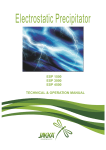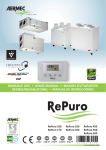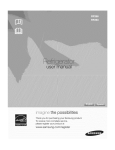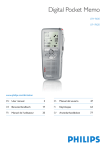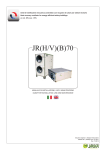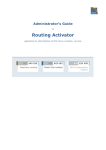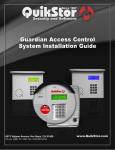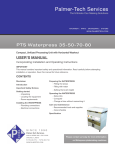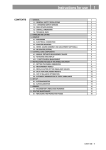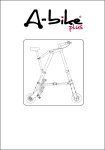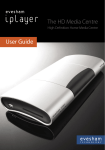Download Manual for JRH(V)54B(B+) heat recovery unit - JAK
Transcript
JRH54B/JRH54B+ Rekuperator toplote Heat Recovery Unit Installation and service manual of high efficient heat recovery units Content 1. Introduction .......................................................................................................... 2 2. Safety ............................................ ....................................................................... 2 3. Construction and application ...................... .......................................................... 5 3.1 Construction .................................................................................................. 7 3.2 Configuration ................................................................................................. 7 3.3 Components .................................................................................................. 8 3.4 Accessories: .................................................................................................. 8 3.5 Overall and joined dimensions ...................................................................... 9 4. Transport and storage ............................. ............................................................15 4.1 Transport ......................................................................................................15 4.2 Loading........................................... ..............................................................15 4.3 Storage ........................................... ..............................................................15 5. Installation and maintenance ..............................................................................16 5.1 Installation ....................................................................................................16 5.2 Maintenance .................................................................................................16 5.3 Air duct system .............................................................................................16 6. Commissioning ...................................................................................................17 6.1 Construction .................................................................................................17 7. Decommissioning ................................... .............................................................18 7.1 Dismantling and disposal.......................... ....................................................18 8. Emergency activities ...........................................................................................18 Safety symbols The following symbols could be found on the products or in the current instruction: DANGER! Warning! Electricity! Components under voltage! Warning! General warning sign. Attention! Attention! Mandatory use of protective gloves and personal protective equipment! Attention! Please, read this part of the instruction carefully! 1 1. Introduction Before start any installation, commissioning or service works, please read very carefully this manual. The high efficient heat recovery units are produced in accordance with all applicable EU requirements. Their installation and usage should be done according to the following instruction. The manufacturer is not responsible for damages due to improper use. This manual is an integral part of the unit. It should be kept in an easy accessible place for the operating personnel. We recommend keeping it near the heat recovery unit. By installation, dismantling, maintaining of cleaning the unit all safety rules should be strictly observed. The use of personal protective equipment is required! Changes in the construction of the unit and all its components without consulting the manufacturer are unacceptable and could lead to improper work of the unit, damages or incidents. By decommissioning it is important to follow strictly the prescription for environmental protection, as well as to dispose of the units in accordance with lo c a l regulation and practices for waste management. 2. Safety It is forbidden, people without needed qualification to handle with the air handling unit or parts of it. All installation and assembly work must be carried out only by specialized technicians. It is forbidden, people without needed qualification to handle with the air handling unit or parts of it. • All installation and service activities should be carried out exclusively by trained specialist personnel. The experts carrying out work on the electrical equipment must have third qualification group. • It is forbidden starting the fans when doors are opened, side panels are missing or not fixed. Closing (locking) instructions of the moving parts are given on the service doors. • Before carrying out repairs or maintenance on the ventilator sections make sure that the power supply is disconnected and it could not be switched back on unexpectedly by 2 another person (for example, to put a warning label on the switch board with sign – “Do not switch on”. Wait 10 minutes before start working. • Before opening the fan section safety doors turn off the electrical power supply of the motors using the safety switches mounted outside the fan housing. • Do not pull or bend cables. They might be under support (high) voltage. • All the elements that stay under support voltage after turning off the main switch are marked with sign • Before carrying out repairs on the electrical board or other elements of the uni t, turn the power supply off and wait 10 minutes before starting to work. • In any case do not touch electrical switches, circuit-breakes or signal lamps with wet hands. • • Check regularly the insulation of the cables or duct joints are not damaged. Check at least once a month the conditions of all signal lamps and protections, build in the air handling unit and the electrical board, using electrical measuring instrument, only when the power supply to the electrical board is turned off. Do not touch terminals in the electrical board or unclad wires, because they might be under pressure. Be very careful when working with voltage over 25V for AC and 35V for DC. Transportation and storage of the air handling unit and electrical board must be carried out in temperature range between (-20° С) and (+40° С). Extremely low/high temperature or high moisture level could shorten the life of the electrical board and its elements, to cause damages, to warp or meld the plastic parts. Handle carefully with the electrical board during installation, because its release could cause damage. Protect the unit from dust and contaminations, beca use they can cause prematurely wear of some parts. Do not use aggressive chemicals, solvents or abrasive detergents to clean the electrical board. Do not install the electrical board on places, where it will be exposed on conditions such as: • • • • • • • • - High dust level. Highly flammable materials, gases and solvents. Strong vibrations. Strong magnetic fields. High humidity. Direct entry of water. 3 • • • • The electrical board should be installed in designe d place covering the requirements for “IP” protection and fire safety. Do not leave objects in front of mounted electric a l board that could prevent the freely access and visibility to the board (e.g. Turning of f the main switch, seeing the signal lamps or opening a door in case of an accident, damage or repairs should be done easily). Never put the electrical board lying on the side with the control components. Before maintenance or service of the electrical board, make sure that the power supply is turned off in order to avoid any serious injuries. For lengthy periods of downtime, the controllers should be in position “off” . • Installation and maintenance should be carried out by trained and qualified specialists (specialized company). Every action should be certified with a protocol. • In order to avoid overheating damage to the system, the water coil should be operated only with the fan running. Risks involved in incorrect handling or use: • Never, for any reason whatsoever, disable, remove, modify or render inoperative in any other way any of the safety, protective or control devices of any single component or of the fan itself. • Never place hands, arms or any other part of the b ody near any moving part. • Never extend any part of the body past the limits o f the safety barriers. Do not use any means that will increase normal accessibility to the unit components. • Never use the unit in atmospheres where there is an risk of explosion. • Unauthorized operators must not attempt to rectify a ny malfunction of the unit and/or modify the functional characteristics or and installation type. • After any un programmed maintenance operation that required the removal of shields, barriers or any other protective device, before res tarting the unit ensure that all these components have been refitted and are fully functional. • All protective and safety devices must be kept in perfect working order at all times. All indicative and warning plates fixed to the unit must also be kept in perfect condition at all times and must never be removed or moved from their original position. • When troubleshooting for the cause of any malfunction of the unit, ensure that all precautions described in this manual have been taken to prevent personal injury and/or damage to property. • Remember to tighten every screw, bolt and nut of v e ry component subject to adjustment or maintenance. • Before starting the unit, ensure that all safety devices have been correctly installed and are in perfect working order; if the above is not the case, do not start the unit and inform the head of safety or department manager immediately. • The operator must be equipped with Personal protect on Equipments in accordance with current legislation; the use of bulky clothing and accessories (ties, loose sleeves, etc.) is prohibited. Other risks related to fans: 4 The following is a list of specific hazards related to the fan’s mechanical characteristics: A person may receive injuries as a result of: • Becoming caught up between a moving parts and a stationary part, for example, between a fan turbine and the fan housing. • Suction of a part of the body into the fan. • A n object becoming sucked into the intake and expelled at high speed from the outlet of the fan. • Contact with surfaces of the fan at dangerous tempe ratures, for example, temperature below -20°C and above +50°C. • The aspiration of air temperature above the specified operating range, which can lead to the deformation and breakage of the housing. Specific risks involved in transporting and installation All installation and assembly work must be carried out only by specialized technicians. • When transport the unit use its original packing and follow instructions given. • A ll operations involving the lifting and handling of the unit must be carried out with the utmost caution, avoiding any knocks that could compromise the functionality or damage the unit components. • Only approved hoist and lifting equipment must be used. • Before installation, the user must prepare adequate connections to earth for the unit to prevent the build-up of electrostatic charges. • A ll installed protective devices must remain fixed to the unit together with their respective fixings (screws, bolts, etc.). The removal of one or more fixing may compromise the functionality and tightness of the safety shield. • In its standard form, the fan is not intended for use in a potentially explosive environment. • The installation location of the fan must be kept clean at all times. Specific risks involved in fan maintenance • During maintenance and cleaning of the fan rotor, be particular careful of the rotor. This can lead to parts of the body becoming trapped and seriously injured between the rotor itself and fixed parts of the fan housing. • Even when the fan is disconnected from the power supply, the rotating parts can still turn due to any air movement through the fan. This air flow may be natural or may be caused by the current induced by another fan installed elsewhere in the connected tubing system. This can also lead to parts of the body becoming trapped and seriously injured between the rotor itself and fixed parts of the fan housing. 3. Construction and application Heat recovery units JRH54B/B+ for second time use of heating / cooling of the exhaust air in the ventilation and air conditioning systems. They are intended for work into non-aggressive and nonsparking environment. The series of heat recovery units covers debits from 250 up to 8500 m3/h (fig.1). The units are designed to work in a clean and not aggressive or explosive environment. These units are designed for ventilation of individual homes and apartments, offices, small stores. 5 Product range of 9 models cover air flows from 250 up to 8500 m3/h. JRH54B/8000 JRH54B/6000 JRH54B/4200 JRH54B/3600 JRH54B/3000 JRH54B/2000 JRH54B/1000 JRH54B/600 JRH54B/400 Available in seven sizes (models) for horizontal and vertical installation, with by-pass and with by-pass and heating section, indicated as followed: • JRH54B/B+ • JRH54B/B+ • JRH54B/B+ • JRH54B/B+ • JRH54B/B+ • JRH54B/B+ H – standard unit, horizontal installation V – standard unit, vertical installation H-BS – unit with bypass, horizontal installation V-BS – unit with bypass, vertical installation H-HBS – unit with bypass and heating section, horizontal installation V-HBS – unit with bypass and heating section, vertical installation Identification: JRH54 B B B+ 400 / 8000 Operation temperature from -20°C up to +40°C. 6 3.1 Construction The supporting construction is made by anodized aluminum profiles from each side closed with heat and sound insulated covers from galvanized metal sheet, electrostatic painted gray (RAL 7035). Inside insulation K-Flex ST 10mm. Fire resistance Class-0-BS 476 PART 6, Class 1-BS 476 PART7. The immovable covers are fixed with screws. Fig.2 The inspection (service) panels are fixed with special reamers for easy dismantle. There is a version with a higher thermal insulation (sandwich panel with thickness 25 mm). 3.2 Configuration JRH54B/B+ 6000 and JRH54B/B+ 8000 7 3.3 Components • Exhaust and blow fan - double inlet fan with built in motor - type CBM – single or three speed (3V) - "S&P" – Spain; • Plate heat exchanger type “air – air” - REC B/B+ (efficiency up to 65%); • Filters for fresh and exhaust air G4 (EU4) - EN 77 9:2002; • Condensing tube with sleeve 1/2"; • By-pass (models JRH54B/B+ -H/V-BS); • Water heating/cooling coil – Models JRH54B/B+/ V -HBS) - EN 779:2002 3.4 • • • • • • • • • • • • Accessories: External high efficiency filter – F7, ΔP max =80Pa; Sound attenuators; External electric heater; Roof for outdoor installation; Flexible duct connectors; 3-way valve for water coil; Freeze protection; Pressure switch;. 3-speed switch; Hanging supports; Basic steps; Frame for outdoor installation. 8 JRH54B/B+ H 400 600 1000 2000 3600 4200 JRH54B/400 JRH54B/600 JRH54B/1000 JRH54B/2000 JRH54B/3000 JRH54B/3600 JRH54B/4200 JRH54B/B+ H 6000 8000 JRH54B/6000 JRH54B/8000 9 JRH54B/B+ V 400 600 1000 2000 3600 4200 JRH54B/400 JRH54B/600 JRH54B/1000 JRH54B/2000 JRH54B/3000 JRH54B/3600 JRH54B/4200 JRH54B/B+ V 6000 8000 JRH54B/6000 JRH54B/8000 10 JRH54B/B+ H-BS 400 600 1000 2000 3600 4200 JRH54B/400 JRH54B/600 JRH54B/1000 JRH54B/2000 JRH54B/3000 JRH54B/3600 JRH54B/4200 JRH54B/B+ H-BS 6000 8000 JRH54B/6000 JRH54B/8000 11 JRH54B/B+ V-BS 400 600 1000 2000 3600 4200 JRH54B/400 JRH54B/600 JRH54B/1000 JRH54B/2000 JRH54B/3000 JRH54B/3600 JRH54B/4200 JRH54B/B+ V-BS 6000 8000 JRH54B/6000 JRH54B/8000 12 JRH54B/B+ H-HBS 400 600 1000 2000 3600 4200 JRH54B/400 JRH54B/600 JRH54B/1000 JRH54B/2000 JRH54B/3000 JRH54B/3600 JRH54B/4200 JRH54B/B+ H-HBS 6000 8000 JRH54B/6000 JRH54B/8000 13 JRH54B/B+ V-HBS 400 600 1000 2000 3600 4200 JRH54B/400 JRH54B/600 JRH54B/1000 JRH54B/2000 JRH54B/3000 JRH54B/3600 JRH54B/4200 JRH54B/B+ V-HBS 6000 8000 JRH54B/6000 JRH54B/8000 14 4. Transport and storage 4.1 Transport The units are supplied fully assembled on a pallet. When transport the unit use its original packing and follow instructions given. All operations involving the lifting and handling of the unit must be carried out with the utmost caution, avoiding any knocks that could compromise the functionality or damage the unit components. During transport, special attention should be paid to all connections (drainage, electrical parts, etc .). In order to prevent damages on the unit all removable parts should be closed and locked during transportation. During transport with truck, the unit should be tightened with belts or ropes that ensure the unit could not move. All movements of the unit should be done with suitable equipment. Assembly components weight should be checked prior to transport. A ll unit components should be inspected for transport damages immediately upon delivery with annotations made on the delivery slip as appropriate. Damages, caused during transport, which are not annotated, cannot be taken into consideration. 4.2 Loading The units could be loaded, uploaded, lifted or move d with suitable equipment, such as forklift truck, crane or hand lift truck. Unit’s dimensions and weight should be checked prior to transport. The unit is supplied on pallet, wrapped in protective film and with protective corners, made of fibran. When unit is loaded/uploaded with fork lift truck, the fork’s length shall be longer than the unit’s. When transporting with hand lift truck the forks must completely underlie the assembly components. If the equipment is larger than the hand lift truck a second hand lift truck should be used for transportation. 4.3 Storage All unit’s components or the entire unit should be stored in safety places, protected against penetration of moisture and dust and other substances that can cause corrosion. The opening of the unit should be covered with folio in order to protect t h e inner space from contamination (dust, animals). The air handling units and their components must be stored in indoor rooms, complying with the following conditions: • -relative moisture φ<80% at t (temperature)=20°C. • -ambient temperature -40°C<t<+60°C. The warranty is not valid for damages, caused by inproper transportation, uploading or storage. 15 5. Installation and maintenance 5.1 Installation There are four possible installation types, in compliance with UNI 10615 specifications: • • • • Type A: open intake and outlet. Type B: outlet connected to a pipe and open intake. Type C: intake connected to a pipe and open outlet. Type D intake and outlet connected to a pipe Depending on the applications that the client intends to use the fan for and on the type of installation chosen, the following safety shields must be fitted: • Type A installation: fixed shields at the intake and outlet • Type B installation: fixed shields at the intake • Type C installation: fixed shields at the outlet When installing the unit, the distance needed at the service side for maintenance or repair is В+50cm (В – width of the unit). If the unit is equipped with multiple leaf dampers, please, make sure the actuator (electric motor) or the manual control mechanism (important when building the duct system) is easily accessible. The installer should ensure that the ceiling structur e is capable of supporting the weight of the device to be installed, bearing in mind that it is a dynamic load. The machine may include different signage pictograms , which must not be removed. The signs are divided into: • Forbidden signs: Do not carry out repairs or adjus tments during operation. • Danger signs: Indicates the presence of elements with tension inside the container on which the notice is displayed. • Identification signs: EC card, indicating the manufacturer’s address and product details. The EC marking indicates that the product forms to European Community standards. 5.2 Maintenance Periodical checks must be carried out in order to ensure the correct work of the air handling unit. It is an owner’s or an owner’s representative duty to keep all the information and documentation, supplied with the unit. 5.3 Air duct system When connecting the air handling unit to the duct system, is recommended the use of flexible connections (fig.7), in order to avoid transmission of noise and vibration. It is obligatory to build a ground connection between both flanges of the flexible connection. Connection between two flanges is made by clamps and bolts. The distance between two bolts should fi 150mm (fig.8). 16 6. Commissioning fig.7 6.1 fig.8 Construction • Ensure that there are no foreign bodies inside the device, and that all the components are securely in place. • Manually check that the fan does not come into con tact with the sides. • Make sure that mounting bolts or duct do not interfere inspection panels. • Make sure that all service doors and panels are closed and fastened. • Make sure that all connections are made correctly. • Check that the inspection flap is closed. • Ensure that ALL connections are properly made. 17 7. Decommissioning When decommissioning a unit, the following activities are to be carried out: • When dismantling a unit, all components, which are under voltage, must be switched off. The unit must be fully disconnected from the electrical network. • All water sections (if any) must be drained. Blown the coils with pressure air to secure that no fluid is left, otherwise the water can freeze, when the temperature is low. • Remove contaminated filters. • All multiple leaf dampers (if any) must be closed. • Fans must be protected from vibration, if it is ne cessary to transport the fan section. • For transport or moving the unit to a new place, al l parts must be secured according to the instruction for transport. • Follow the instruction when transport, lifting, loading and uploading the unit. • If you can handle this alone, please, contact the manufacturer. 7.1 Dismantling and disposal After the “lifetime” of the unit is run out, it must be professionally dismantled. Prior to dismantling, it must be ensured that all energy lines (electrical and all media) are switched off. No lines should remain supplied with voltage, temperature or other energy. All components are to be disposed or recycled in accordance to national regulations. 8. Emergency activities In case of emergency the installation stops automat ically, in order to prevent its components from damages. If you have any doubts, that the air handling unit does not work or the service personnel could not deal with an emergency situation, turn the air handling unit off, using the main switch S1, and turn off the power supply to the electrical board. Take all necessary measures to prevent fire, electrical shock or environmental pollution and contact JAKKA local service team. Contacts: Phone: +381 (0)11 3070 392 E-mail: [email protected] www.jakkagroup.com All national regulation for fire protection must be observed. 18 JAK-KA GROUP - SRBIJA JAK-KA GROUP - CRNA GORA Adresa: Bulevar Zorana Đinđića 80 11070 Novi Beograd, Srbija Telefon: +381 (0)11 2 600 901 Faks: 381 (0)11 2 600 906 Adresa: V Crnogorske brigade 3 85347 Igalo, Crna Gora Telefon: +382 (0)31 330 285 Faks: +382 (0)31 330 285 Mobilni: +382 (0)69 517 008 www.jakkagroup.com Web: e-mail: [email protected] www.jakkagroup.com Web: e-mail: [email protected]





















